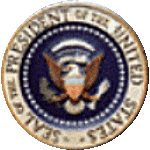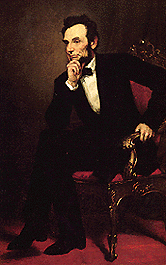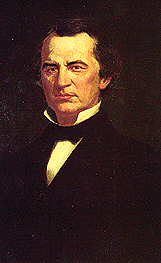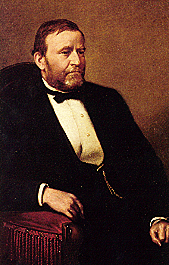Presidents 16-18


Abraham Lincoln

On June 16, 1858, Abraham Lincoln addressed a convention of
Republicans in Illinois. He warned them that the conflict in the United States
over slavery "will not cease, until a crisis shall have been reached, and
passed. A house divided against itself cannot stand. I believe this government
cannot endure, permanently half slave and half free." Lincoln's words
were prophetic. His victory in the presidential election of 1860 triggered the
crisis that Lincoln had predicted.
Born on February 12, 1809, in Hardin (present-day Lorue) County, Kentucky,
Abraham Lincoln was a child of the frontier. Lincoln's father was a poor
carpenter and farmer who moved his family to Indiana in 1816, where the young
Abe helped support his family by splitting logs.
Abraham Lincoln had less than a year of formal schooling in his whole life.
But he taught himself to read and spent hours reading by firelight.
After Lincoln left home, he opened a store in Illinois. There, he studied law
on his own and launched a career in politics. After spending eight years in
the state legislature, Lincoln served one term in Congress.
People in Illinois admired his honesty and wit. Lincoln's plainspoken manner
made him a good speaker. Even so, a listener once complained that he could not
understand one of Lincoln's speeches. "There are always some fleas a dog
can't reach" was Lincoln's reply.
On November 4, 1842, Lincoln married Mary Todd, the daughter of a prominent
Kentucky businessman. The couple were devoted to each other, and they had four
sons. Tragically, only the first lived to adulthood. The Lincolns found the
deaths of their sons almost unbearable.
In the early years of his political career, Lincoln ran as a Whig. But in the
1850s, he left the dying Whig party and joined the new antislavery Republican
party. At that time, the slavery issue was the most important problem the
nation faced.
When Lincoln, who was six feet, five inches tall, ran for an Illinois Senate
seat in 1858, his opponent was five foot tall Stephen Douglas, the
"Little Giant." Douglas advocated popular sovereignty as the answer
to the slavery question. Lincoln, though, believed that slavery was evil and
must not be allowed to spread to new territories or states. Lincoln challenged
Douglas to a series of debates.
Although he lost the election to the Senate, the Lincoln-Douglas debates
turned Lincoln into a national figure. His eloquent antislavery speeches made
him the most important spokesman of the Republican party. In 1860, Republicans
backed Lincoln as their presidential candidate. Taking the strongest
antislavery position of any candidate, Lincoln carried the North and won the
election.
Lincoln's election sparked a crisis. One by one, the southern states seceded
from the Union. President Buchanan did nothing to stop them. By the time
Lincoln was inaugurated, the South had become the Confederate States of
America. When Confederate forces attacked Fort Sumter in Charleston Harbor,
South Carolina, the Civil War began in earnest.
Lincoln is so often remembered as a great moral leader that it is sometimes
forgotten that it took a skillful politician to win the Civil War. He firmly
believed that preserving the Union was more important than any other goal, and
he carefully crafted every policy with that in mind. Even his opposition to
slavery had to come second to the task of winning the war and keeping the
Union intact. Lincoln feared that acting against slavery could cause the
border states to join the Confederacy. He also knew that many northerners did
not favor abolition, and he feared losing their support if the war became a
crusade against slavery. Only when the border states were firmly controlled by
Union troops, and northern opinion had been changed by two years of bloody
war, did the President feel confident enough to actively oppose slavery.
By mid-1862, Lincoln felt the time was right to take action. On January 1,
1863, he issued a proclamation declaring that the slaves in the Confederacy
were free. The Emancipation Proclamation effectively linked the fight against
slavery with the war for the union. Many people felt that the northern cause
gained a new moral dimension: the soldiers in blue were fighting not only for
their country, but for freedom.
Claiming a state of national emergency, Lincoln suspended the civil rights of
other Americans. Thousands of suspected rebel sympathizers were thrown in jail
without trial. The President went to such extremes to preserve the Union
because he believed the idea of democratic government itself was being put to
the test.
On November 19, 1863, in a memorial service for soldiers who had died at the
Battle of Gettysburg, Lincoln gave his most famous speech, the Gettysburg
Address. He stated that Americans must "highly resolve. . . . that
government of the people, by the people, for the people, shall not perish from
the earth."
Few problems were as troubling to Lincoln as finding the right generals to
lead the northern armies. None could match the brilliance of the Confederacy's
Robert E. Lee. Finally, Lincoln decided that the most successful general of
the western theater, Ulysses S. Grant, was the man for the job. Although
Grant's aggressive campaigns cost the North tens of thousands of men, Lincoln
stuck by his general.
By late 1864, the northern armies had achieved enough success to help Lincoln
beat the Democratic candidate, General George McClellan, in the presidential
election. On April 9, 1865, General Lee surrendered his army to Grant at
Appomatox Courthouse, and the war finally ended.
Lincoln, however, would enjoy the peace for only five days. On April 14, 1865,
he attended a play at Ford's Theatre in Washington D.C. John Wilkes Booth, an
actor with southern sympathies, snuck into the President's box and shot
Lincoln in the head. Lincoln died the following morning.
Lincoln's body was transported by train from Washington, D.C., to Springfield,
Illinois. Millions of Americans turned out to watch the train pass, and to
mourn for one of the greatest Presidents of the United States.

Andrew Johnson

In 1861, Tennessee seceded from the Union to join the other
southern states in forming the Confederate States of America. When Tennessee
Senator Andrew Johnson announced that he would remain loyal to the Union and
retain his Senate seat, he was denounced throughout the state. Johnson's
hometown hung a banner reading, "Andrew Johnson, Traitor." But
Johnson was a man who would rather follow his conscience than be popular.
Johnson grew up in Raleigh, North Carolina. His father, a porter, died when he
was 3 years old, and the Johnson family was extremely poor. Throughout his
life, Johnson would sympathize with the underprivileged and he considered
himself their champion.
Johnson's mother apprenticed Andrew and his older brother to a tailor when
Andrew was 14 years old. The boys were really indentured servants with no pay
and no rights. After two years, the brothers ran away, and by age 17, Andrew
had set up his own tailor shop in Greeneville, Tennessee. Although he never
attended school, Johnson taught himself to read. His young wife, Eliza, whom
he married when he was 18, taught him to write and do arithmetic.
Johnson was a serious, hard-working man with no sense of humor but lots of
determination. He also had a temper, which he found hard to control even when
he became a public figure. If anyone dared to shout insults at Johnson during
one of his speeches, he would simply yell right back.
Johnson was involved in local politics in Tennessee by the time he was 20. At
33, he was elected to Congress as an Andrew Jackson Democrat. He later became
governor of Tennessee, and then a member of the United States Senate.
As the Civil War loomed, Senator Johnson tried to keep Tennessee in the Union.
Although he had voted with the southern states on almost every issue, he could
not support secession. When Johnson refused to secede along with his state, he
became a hero to the North.
In 1864, Lincoln asked the Republican party leaders to replace Vice President
Hannibal Hamlin with Johnson in order to balance his ticket with a southern
Democrat. Confident that Johnson would never become President, Republicans
agreed. But they were wrong. On April 14, 1865, Lincoln was shot. The next
morning, Johnson took the oath of office.
The most important issue after the end of the Civil War was Reconstruction.
Johnson attempted to establish a lenient reconstruction policy like the one
Lincoln had planned. But the Radical Republicans who controlled Congress
wanted harsher penalties for white southerners and protection of the rights of
freed slaves.
Johnson soon found himself at war with Congress. In order to prevent Johnson
from removing Cabinet members who were Radical Republicans, Congress passed
the Tenure of Office Act. The act made it illegal for the President to fire a
Cabinet member without the approval of Congress. Despite the legislation,
Johnson fired Secretary of War Edwin Stanton.
In February 1868, the House of Representatives voted to impeach Johnson. The
Radical Republicans needed two-thirds of the Senate to vote guilty in order to
remove Johnson. In the end, he was acquitted by just one vote. Andrew Johnson
remained President until the end of his term.
Johnson returned to Tennessee a hero. His hometown now hung a banner reading
"Andrew Johnson, Patriot." He remained in politics and even returned
to the Senate shortly before he died in 1875. In his will, he requested that
he be buried with a copy of the Constitution beneath his head.

Ulysses S. Grant

Few Americans have had such a roller coaster career as did
Ulysses S. Grant. If the Civil War had never occurred, he probably would have
died in poverty. Instead, he was hailed as the savior of the Union and
catapulted to the White House -- only to experience failure once again.
Shortly before his death, Grant was as poor as he had ever been, and yet in
the end he triumphed.
Hiram Ulysses Grant was born on April 27, in Point Pleasant, Ohio. As a boy,
he was an average student at best. His father arranged for him to attend West
Point, even though Grant showed little desire for a military career.
The Mexican War gave him a chance to prove his abilities on the battlefield.
Although Grant thought the war was "one of the most unjust ever waged by
a stronger against a weaker nation," he performed well under fire and
rose to the rank of captain.
After the war, Grant married Julia Dent, the sister of a West Point classmate,
and the couple began a family. In 1852, he was assigned to a remote post in
California. Grant was so miserable and bored that in 1854 he resigned his
commission and returned to his family. Grant found it difficult to make a
living outside the army, however. He tried his hand at farming and real
estate, but failed at both endeavors.
The Civil War presented Grant with a new military opportunity. The governor of
Illinois appointed him to command a regiment of volunteers, and Grant quickly
won promotion to major general. He captured national attention by seizing Fort
Henry and Fort Donelson from the Confederates in 1862, and the fortress city
of Vicksburg the following year.
Grant's successful campaign against Vicksburg convinced President Lincoln that
Grant was the general for whom he had been looking. Lincoln gave Grant command
of all the Union forces, and in March of 1864, Lincoln brought Grant east to
fight Robert E. Lee.
Unlike other Union generals, Grant refused to be frightened by Lee. Like Lee,
Grant possessed intelligence, determination, and an iron nerve. Grant
confidently mounted a relentlessly aggressive campaign against Lee's army.
Both armies suffered heavy casualties, but Grant knew that the North could
afford the losses and that the South could not. Lee finally surrendered to
Grant on April 9, 1965, at Appomattox Court House in Virginia.
After Lincoln was assassinated, Grant was the most popular man in the North.
The Republicans decided to recruit the war hero as their presidential
candidate, to take the place of the despised Andrew Johnson. Grant defeated
Democrat Horatio Seymour in the 1868 election.
Although Grant was personally honest, his administration was plagued with
corruption. The President was easily impressed by rich and successful people,
and often trusted men who used their friendship with him for financial gain.
The trickle of scandal during Grant's first term was not enough to prevent him
from winning reelection in 1872. But the trickle became a wave during his
second term. Grant's Vice President, his Secretary of War, and even his
private secretary were accused of taking bribes or stealing government money.
Grant wanted a third term and a chance to redeem himself, but the Republicans
had had enough. They nominated Rutherford Hayes in 1874.
Grant's last battle was to save his family from poverty. He had invested
$100,000 in his son's firm, but his son's partner betrayed the Grants's trust.
In 1884 the firm went bankrupt. That same year, Grant found he was dying of
throat cancer. Mark Twain promised that if the ex-general could finish his
memoirs, Twain could sell them for a fortune. Grant raced to finish his book,
often writing while in terrible pain. He completed it just four days before he
died, on July 23, 1885. Twain kept his promise, and The Personal Memoirs of
U.S. Grant made $450,000 for Grant's family. The Memoirs are now regarded as a
classic American autobiography.

All images of Presidents are courtesy of whitehouse.gov
Information taken from Software titled "American Heritage The History of
the United States for Young People.
The copyright belongs to: Forbes
Inc. and Byron Preiss Multimedia Company. Thank You!

Washington, Adams, Jefferson
Madison, Monroe, Adams
Jackson, Van Buren, Harrison
Tyler, Polk, Taylor
Fillmore, Pierce, Buchanan
Lincoln, Johnson, Grant
Hayes, Garfield, Arthur
Cleveland, Harrison, Cleveland
McKinley, T. Roosevelt, Taft
Wilson, Harding, Coolidge
Hoover, F. Roosevelt, Truman
Eisenhower, Kennedy, Johnson
Nixon, Ford, Carter
Reagan, Bush, Clinton
Bush, ????, ????
|

|
All graphics and
pages are copyright © 1997 - 2008 Pages 4 Ever
(except where noted). Do not take, copy, steal, plagiarize or use in any
way, shape or format without the express written permission of Pages
4 Ever.
Some backgrounds and graphics made from clipart acquired from ArtToday, Boxed Art,
friends, my own imagination, and/or
graphic CD collections that I have purchased. If you find anything on this site
that you have copyright to, and can prove it, please let me know and I will
gladly either remove it or place a link back to you, whichever you prefer.
If you should find any broken links, please drop us a line and let us know the
exact URL the broken link is on. Thank you.
|

|
![]()




